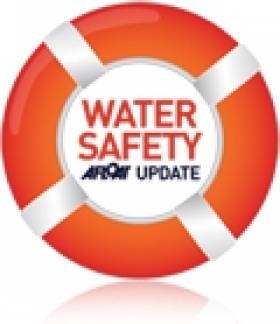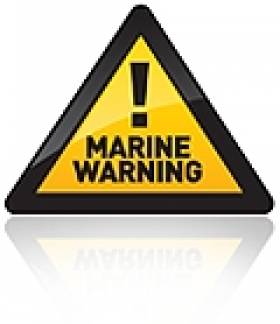Displaying items by tag: Marine Casualty Investigation Board
Report on Cargoship Grounding at the Boyne Bar
#MCIB REPORT– A report investigating the grounding of the Arklow Raider (2007/2,999grt) at the mouth of the River Boyne in 2010, was published yesterday by the Marine Casualty Investigation Board (MCIB).
The 89m general cargoship managed by Arklow Shipping Ltd had docked in Drogheda on 10th November to discharge a full cargo and this was followed by loading cement in bulk.
The Dutch built vessel remained in the Co. Louth port until she departed on the evening tide of the 16th November, however as the vessel passed the bar at the entrance to the River Boyne, it took to the ground and became fast.
The vessel was successfully re-floated on 19th November. Once afloat, checks were made and the vessel was towed to Dublin. At Dublin, the cargo was transhipped to another vessel and the vessel entered dry dock in the port for repairs to the hull and steering gear. Nobody was injured and no pollution occurred.
To read the report in full, copies in PDF format are available to download from the MCIB website HERE.
#MCIB - The Marine Casualty Investigation Board (MCIB) has recommended that the Government review standards for activity centres involved in marine sports, following its report into an incident off Co Louth in May 2011.
Seven sixth-class pupils from St Brigid's Girls National School in Glasnevin were stranded in the water when their kayaks capsized in rough conditions near the Neptune Outdoor Centre in Clogherhead on 26 May last year.
Six of the girls were rescued by the RNLI Clogherhead lifeboat, while a seventh who had been separated from the group managed to reach the shore with some difficulty. No injuries were reported in the incident.
Among its findings, the MCIB concluded that as it had no official affiliation with either the Irish Sailing Association or the Irish Canoe Union, the Neptune Outdoor Centre - which has since ceased trading - was effectively unregulated with no monitoring of staff or operations.
It was also found that the instructor on the day had no formal qualifications in taking charge of a group of young people on the water, despite many years of experience in marine sports.
Moreover, there was no support boat available to mount a rescue attempt, a number of the pupils involved had ill-fitting buoyancy aids, and the weather conditions at the time of the incident were not conducive to taking a group of novices out on the water.
It was noted that some of the pupils involved credited a water safety course with helping them to take the right course of action when in the water, such as staying with their craft and floating with the waves on their backs.
The MCIB recommends that the Minister for Transport, Tourism and Sport reviews the existing arrangements for marine-based activity centres, and in particular develop standards for safety management (including weather checks, pupil-to-teacher ratio, etc), safety equipment (lifejackets, VHF radios, etc) and instructor qualifications.
The full report is available as a PDF from the MCIB website HERE.
Marine Notice on Legal Requirements for Personal Flotation Devices
#WATER SAFETY - The latest Marine Notice from the Department of Transport, Tourism and Sport (DTTAS) addresses the legal requirements for all recreational craft owners, masters and users in relation to the wearing and carrying of personal flotation devices (PFDs).
The notice discusses the different types of PFDs - lifejackets and buoyancy aids - and their performance standards, as well as highlighting the importance of their use, proper care and servicing for safe activities on the water.
The law makes clear that there must be suitable PFDs for everyone on board any pleasure craft, and that PFDs must be worn by anyone the deck of any craft or on board any open craft that is under seven metres in lengh - or for people under the age of 16, any craft regardless of length.
Also detailed are recommendations for the storage of PFDs, and guidance for their correct usage.
The use of lifejackets and buoyancy aids is particularly important in light of the recent Marine Casualty Investigation Board (MCIB) recommendations on a number of incidents where their availability could have saved lives.
Full details are included in Marine Notice No 45 of 2012, a PDF of which is available to read or download HERE.
MCIB Again Cites Lack of Lifejackets in Na Buachaillí Capsize Death
#MCIB - Marine investigators have again highlighted the lack of lifejackets as contributing to loss of life in the official report into the capsizing of a fishing vessel off Co Wexford last year.
Crewman John Ennis was lost when the two-man vessel Na Buachaillí capsized and sank close to the shore in Waterford Estuary near Duncannon on 18 February 2011.
Skipper and owner Richard McNamara survived the incident. More than a month later, Ennis's body was recovered from the water on 21 March 2011. Neither man had been wearing a lifejacket despite all requisite safety equipment being available.
According to the report from the Marine Casualty Investigation Board (MCIB), the boat had been dredging for mussels in the estuary – using a custom gantry installed at the stern – when McNamara steered to port to make way for a merchant ship and the Waterford pilot boat which were coming down river.
Using a motorised winch, McNamara hoisted the dredge to which Ennis attempted to attach the line when the vessel began to list to starboard. The skipper returned to the winch controls but was unable to drop the dredge. He saw that Ennis was holding onto the dredge gantry, bracing himself against the list.
McNamara then tried to enter the wheelhouse to activate the EPIRB emergency beacon but the boat was now listing rapidly and he was forced by a rush of seawater into an area forward of the engine under the forward deck.
By a quirk of fate the water flow suddenly reversed and McNamara was thrown out of the wheelhouse, and he just managed to grab gold of a lifering mounted on the wheelhouse roof before swomming to shore to raise the alarm.
The vessel was later recovered by Naval divers who found no damage to the hull nor any evidence that the dredge or any other part of the boat has been snagged by something in the water.
Based on the evidence gathered by investigators, the most likely reason for the capsize was the result of instability resulting from the vessels position between the onshore wind and the outgoing tide, exacerbated by the vessel's higher than recommended breadth-to-depth ratio.
The listing was compounded by the boat's interconnected fuel tanks, while the distribution of the mussel catch on deck and the apparent starboard lean of the suspended dredge may have also played a role.
Echoing its recent reports into the drowning of three men on a fishing trip of West Cork in August 2010, as well as the loss of two lobstermen off Skerries in April 2011, the MCIB recommends that lifejackets be worn at all times while on a vessel.
It also notes that emergency beacons should be mounted outside the wheelhouse for better accessibility and preferably be of the automatic free-float type.
Additionally, the MCIB has called for proper authorisation of physical alteratuons to small fishing vessels that may affect stability, and recommends revisions of the Department of Transport, Tourism and Sport's (DTTAS) Code of Practice for such vessels under 15m in length with reference to stability, EPIRBs and life rafts.
The full report is available to download as a PDF from the MCIB website HERE.
Four Deaths At Sea Set To Be Investigated
#MCIB - The bodies of two fishermen missing off Co Clare have been recovered, as The Irish Times reports.
Local divers found the remains shortly before lunchtime yesterday near Spanish Point as coastguard teams searched for a missing fishing boat.
As previously reported on Afloat.ie, the Lady Eileen - with two crew on board - was due to return to Quilty on Monday evening.
Searchers discovered debris and diesel in the water near Spanish Point in the early stages of the search on Monday night.
Meanwhile, the body of a father-of-three from Clare Island in Co Mayo was recovered from the sea by local fishermen last night.
The man - whose name is being withheld till all relations have been informed - was reported missing by a relative after he failed to return from a fishing trip in his currach.
The Marine Casualty Investigation Board (MCIB) is expected to open investigations into both incidents, as well as the death of John O'Leary of Allihies in West Cork, who lost his life after the Enterprise dinghy he was sailing with his son capsized off the Beara Peninsula on Monday.
New Marine Notices on Small Vessel Safety
#MARINE WARNING - Two recent Marine Notices from the Department of Transport, Tourism and Sport (DTTAS) highlight the safety recommendations made in reports by the Marine Casualty Investigation Board (MCIB) earlier this year into separate small vessel accidents, one of which resulted in the death of two fishermen.
Marine Notice No 39 of 2012 details recommendations from the report into the Lady Linda tragedy off the coast of Skerries in North Dublin in April last year, which cost the lives of 26-year-old Ronan Browne and 41-year-old David Gilsenan.
In its investigation, the MCIB noted a number of contributary factors to the incident, such as weather conditions and wave height, the absence of lifejackets and the inaccessibility of emergency equipment.
The DTTAS is urging all fishermen to check weather conditions before any voyage and ensure that their vessel can cope with them safety. It also reiterates the legal obligation for fishermen to wear suitable personal flotation devices while on deck, and that the carriage of an EPIRB distress becaon is mandatory for all fishing vessels.
Meanwhile, Marine Notice No 40 of 2012 concerns the carriage of livestock aboard small vessels, after an incident on the MV Claire Buoyant off Beginish Island in Co Kerry in August a year ago that led to a cargo of 21 sheep being jettisoned overboard.
The MCIB report reminded that any vessel carrying livestock must be appropriately certified due to the dangers involved in transporting live cargo. It also recommended that such vessels develop a regular maintenance regime to check all fittings that are open to the sea, and to ensure that bilge pumps are free from blockage.
#MCIB - The families of two fishermen found dead at sea off the Skerries last April may never uncover the circumstances that led to their demise. But the official report into the incident indicated that the absence of lifejackets was a significant contributing factor.
Ronan Browne (26) and David Gilsenan (41) were reported missing on the evening of 1 April after failing to return from a trip tending to lobster pots.
Their vessel, Lady Linda, was found the following morning upturned in an oil slick off Clogherhead with no sign of the crew.
It wasn't until a week later that their bodies were discovered caught in the vessel's fishing gear some five miles east of Clogherhead, as previously reported on Afloat.ie.
Post-mortem results found that both men died from drowning, with Gilsenan also showing signs of hypothermia.
With no eyewitnesses to the incident, the report by the Marine Casualty Investigation Board (MCIB) indicated a number of possible causes from eqiupment malfunction or shifting of lobster pots on deck, to the wave height and weather conditions on the day, which were reportedly deteriorating when the boat left port.
It also said that Browne and Gilsenan "were lifelong friends, both men were experienced and qualified marine engineers in the fishing vessel industry. Both men were experienced in boat handling and fishing and had worked together on many occasions."
But the report emphasised the lack of personal flotation devices (PFDs) on board, and noted that emergency equipment was stored under the deck and not easily accessible.
The MCIB's recommendations include a review of the code of practice for fishing vessels under 15m to establish "revised stability critera" and ensuring that all boats are fitted with automatic radio beacons that deploy upon capsize.
In a separate incident, lack of proper maintenance led to an unlicenced boat taking on water off Co Kerry last August.
The Claire Buoyant was carrying one crew, five passengers and 21 sheep from Beginish Island to Ventry when the vessel began to lose stability.
Skipper Eoin Firtear - who the MCIB described as having "limited sea-going experience" - and his five passengers were rescued by passenger ferry. All sheep were jettisoned overboard, with 18 eventually recovered.
The report reminded that the carriage of livestock should only be undertaken in appropriately certified vessels.
- MCIB
- Marine Casualty Investigation Board
- report
- Lady Linda
- Clogherhead
- Ronan Browne
- David Gilsenan
- lobster pots
- Fishing
- drowning
- hypothermia
- missing
- malfunction
- wave height
- Weather
- lifejackets
- Personal Flotation Devices
- PFDs
- Code of Practice
- stability
- Radio
- beacon
- maintenance
- unlicenced
- Co Kerry
- Claire Buoyant
- Sheep
- Passengers
- Beginish Island
- Ventry
- Eoin Firtear
- Skipper
- Rescue
- Livestock
Safety Advice for Leisure Boaters in MCIB's Helvick Head Report
#MCIB - The Marine Casualty Investigation Board (MCIB) has called for better safety awareness among leisure boat users in its report into the deaths of two men off Helvick Head in Co Waterford in May 2010.
John O'Brien and Pat Esmonde were lost overboard from their small RIB on 23 May 2010, and their remains were recovered two days later. Post-mortems confirmed that both died by drowning.
The report does not conclude exactly how the incident occurred. But accounts from eyewitnesses who sighted the men in the minutes before state that neither was wearing a lifejacket, despite the legal requirement to do so - and despite O'Brien having no seafaring experience and Esmonde being unable to swim, as confirmed by their families.
The MCIB also noted that while there were two lifejackets aboard the vessel, they were for emergencies and not suitable for constant wear as per the requirements for the vessel class.
Other safety issues highlighted include the kill-cord on the engine, which was not being used, and the fact that the initial distress call was made by mobile phone and not VHF radio.
Though neither had any bearing on this specific incident, the MCIB warned in particular that mobile phone calls are closed in nature, whereas VHF distress calls can be heard and answered by any vessel in the vicinity.
The board recommends that the Minister for Transport "undertakes a highly visible information poster campaign on piers and launching areas relating to lifejackets, VHF radio and emergency contact details" and also reminds boaters of their legal obligations.
The full report is available to download as a PDF from the MCIB website HERE.
#MCIB - The decision to set out in poor weather, coupled with limited safety instruction, led to the tragic death of a Romanian angler on Lough Mask last summer, according to a report by the Marine Casualty Investigation Board (MCIB).
Mircea Ungur drowned after the angling boat he was in capsized in choppy waters brought on by squalling Force 8 winds on the afternoon of 8 May 2011.
Ungur had a tracheostomy tube in his throat resulting from a previous battle against throat cancer, and drowned after taking in water through this tube, the MCIB concluded. It was also found that most of his companions and the guide knew nothing about the tube.
At the time of the incident, Ungur had been on an angling holiday in Co Mayo with five colleagues accompanied by a fishing guide. On the morning of 8 May the group set out from Cappaduff in Tourmakeady on two boats, following a brief discussion about fishing and safe departure from the pier.
Winds were already reaching Force 4-6 when the group departed and sought a sheltered area of the lough to fish. After lunch winds had picked up to Force 8 and the guide signalled for a return to Tourmakeady.
At around 1.5km from the pier at Cappaduff, a wave swamped the leading boat that contained Ungur, a companion and the guide. All three on board, who were wearing buoyancy aids, went into the water.
Ungur was the first taken on board the other boat after some 10 minutes in the water. He was not moving or communicating with the others, and CPR was not administered until the boat reached the shore 20 minutes later. Ungur was pronouced dead just before 3pm.
The report concluded that the group had departed despite reservations among them about the poor weather, which had been correctly forecast that day. There was also little discussion with the anglers about their level of boating experience, the weather, or any disabilities that would affect their safety on the water.
The MCIB recommended that a full safety briefing should be given to all those hiring angling boats. It also urged the enforcement of safety regulations and certification for recreational water craft.
The full report is available to download as a PDF from the MCIB website HERE.
Report into Death of Crab Fisherman Prompts Call for Review of Stability Standards
#MCIB - The Marine Casualty Investigation Board (MCIB) has recommended a ministerial review of stability standards for fishing vessels following its report into the death of a crab fisherman off Co Cork in January last year.
Gerry Hegarty drowned after a wave struck the crab boat Carraig An Iasc, which was fully loaded with crab pots at the time, causing it to capsize and sending its two-man crew into the water.
Hegarty, who was not wearing a personal flotation device (PFD) or other buoyancy aid, got into difficulty while attempting to swim ashore with his crewmate and skipper James Fitzgerald, who subsequently raised the alarm.
Lifeboats from Ballycotton and Crosshaven, as well as Irish Coast Guard helicopter Rescue 117, were tasked to the incident. Divers from Naval Service vessel LE Emer located the sunken crab boat but no body was found.
A coastguard search of the area continued over a number of days without success. Hegarty's body was eventually recovered on 17 February 2011 at Ringabella Strand in Co Cork.
The MCIB found it probable that the Carraig An Iasc encountered wind or wave action or a combination of both that caused the vessel to heel to an angle beyond which it was able to recover from its loaded condition. The vessel's Code of Practice Declaration of Compliance was valid until 15 July 2013.
The board noted that there have been "a number of incidents caused by overloading boats thus effecting stability", and recommended that the Minister for Transport reviews and revises the stability standards in the current Code of Practice to improve these standards.
It was also recommended that a safety notice be issued to all skippers and owners in the fishing fleet reminding them of their legal responsibility to ensure that all their crew wear PFDs or lifejackets while on deck.
The full report is available to download as a PDF from the MCIB website HERE.
- Crosshaven
- Cork
- Safety
- Fishing
- Ballycotton
- Lifejacket
- Lifeboat
- Marine Casualty Investigation Board
- Coastguard
- Irish Coast Guard
- Skipper
- naval service
- helicopter
- MCIB
- Rescue 117
- personal flotation device
- Minister for Transport
- LE Emer
- standards
- drowned
- crab fishing
- Carraig An Iasc
- Gerry Hegarty
- James Fitzgerald
- PFD
- Ringabella Strand
- Code of Practice
- stability
- overloading


































































